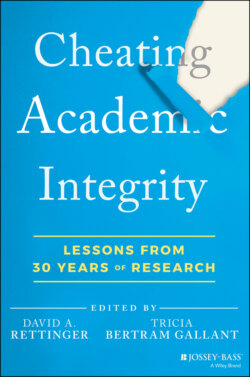Cheating Academic Integrity

Реклама. ООО «ЛитРес», ИНН: 7719571260.
Оглавление
Группа авторов. Cheating Academic Integrity
Table of Contents
List of Tables
List of Illustrations
Guide
Pages
Cheating Academic Integrity. LESSONS FROM 30 YEARS OF RESEARCH
List of Authors
CHAPTER 1 Cheating Academic Integrity: Lessons from 30 Years of Research
INTRODUCTION OF EACH CHAPTER
CONCLUSION
REFERENCES
CHAPTER 2 Trends in Plagiarism and Cheating Prevalence: 1990–2020 and Beyond
TIME‐LAG STUDIES OF PLAGIARISM AND CHEATING
Stiles et al. (2018)
McCabe et al. (2012)
Curtis and Tremayne (2021)
Trends from the time‐lag studies
TRENDS IN THE PREVALENCE OF SELF‐REPORTED COMMERCIAL CONTRACT CHEATING
STUDIES OF INTERVENTION‐RELATED CHANGE IN ACADEMIC MISCONDUCT
CONCLUSIONS ON TRENDS IN THE PREVALENCE OF PLAGIARISM AND CHEATING: 1990–2020
CURRENT AND FUTURE THREATS TO ACADEMIC INTEGRITY
CONCLUSION
Funding Details
Disclosure Statement
REFERENCES
CHAPTER 3 The Past and Future of Contract Cheating
BACKGROUND
CONTRACT CHEATING RESEARCH. The Contract Cheating Research Field
Contract Cheating Research Quantity
Contract Cheating Research Results
The Extent of Contract Cheating
FUTURE DEVELOPMENTS. The Need for Future Awareness
Automated Writing and Editing Systems
Contract Cheating Detection
Cybersecurity Risks to Institutions and Students
RECOMMENDATIONS
REFERENCES
NOTE
CHAPTER 4 Academic Motivation and Cheating: A Psychological Perspective
INTRODUCTION
ATTRIBUTION THEORY
Attributions and Academic Integrity
ACHIEVEMENT GOAL THEORY
Achievement Goal Theory and Academic Integrity
SOCIAL‐COGNITIVE THEORY
Social‐Cognitive Theory and Academic Integrity
SITUATED EXPECTANCY‐VALUE THEORY
Situated Expectancy‐Value Theory and Academic Integrity
SELF‐DETERMINATION THEORY
Self‐Determination Theory and Academic Integrity
MOVING THE RESEARCH FORWARD
IMPLICATIONS FOR PRACTICE
CONCLUSION
REFERENCES
CHAPTER 5 The Moral Puzzle of Academic Cheating: Perceptions, Evaluations, and Decisions
ACADEMIC CHEATING: WHAT, WHEN, AND WHY? WHAT IS CHEATING?
WHEN DOES CHEATING HAPPEN?
WHY STUDY CHEATING? ITS PRACTICAL AND THEORETICAL SIGNIFICANCE
PRIOR THEORETICAL APPROACHES TO CHEATING AND THE JUDGMENT‐ACTION GAP
A SITUATIONAL AND MORAL‐PSYCHOLOGICAL ACCOUNT OF ACADEMIC CHEATING: PERCEPTIONS, EVALUATIONS, AND DECISIONS
PERCEPTIONS: SOME ACTS OF CHEATING ARE UNINTENTIONAL
EVALUATIONS: PEOPLE DEEM CHEATING ACCEPTABLE IN SOME CIRCUMSTANCES
DECISIONS: UNDER CERTAIN PRESSURES, STUDENTS SOMETIMES CHEAT DESPITE JUDGING CHEATING AS WRONG
CONCLUSION
REFERENCES
CHAPTER 6 It's in the Pedagogy: Evidence‐Based Practices to Promote Academic Integrity
FACTORS INFLUENCING STUDENT ENGAGEMENT IN ACADEMIC MISCONDUCT
PEDAGOGICAL SOLUTIONS FOR PROMOTING INTEGRITY
UTILITY AND RELEVANCE OF ASSIGNMENTS
CLARITY OF EXPECTATIONS
LEARNING PARTNERSHIPS
LOW STAKES ASSESSMENTS WITH FEEDBACK
EQUITY PEDAGOGY AS A SOLUTION TO FACTORS IMPACTING ACADEMIC MISCONDUCT CHOICES
APPLYING PEDAGOGICAL SOLUTIONS: HIGH IMPACT PRACTICES
PROJECT‐BASED LEARNING
SERVICE‐LEARNING
COURSE‐BASED UNDERGRADUATE RESEARCH EXPERIENCES (CURES)
IMPLEMENTATION OF HIGH IMPACT PRACTICES (HIPS)
CONCLUSION
REFERENCES
CHAPTER 7 Beyond Doing Integrity Online: A Research Agenda for Authentic Online Education
CONTEXTS AND DEFINITIONS
EDUCATIONAL INTEGRITY AND ONLINE LEARNING
WIDENING ACCESS TO AUTHENTIC LEARNING ONLINE
DETERRENT TECHNOLOGY AND THE NEW CHEATING ECONOMY ONLINE
ONLINE EDUCATION'S INNOVATIONS IN AUTHENTIC LEARNING
Social Presence
Cognitive Presence
Teaching Presence
CONCLUSION
REFERENCES
CHAPTER 8 Celebrating 30 Years of Research on Academic Integrity: A Review of the Most Influential Pieces
THE CREATION OF THE ICAI READER
CONTENT THEMES
RESEARCH APPROACHES: TRENDS AND DEVELOPMENTS
Methods
Participant Samples
Data Analysis
OTHER CONSIDERATIONS
RESEARCH SUGGESTIONS FOR THE COMING DECADE
CONCLUSION
REFERENCES3
NOTES
CHAPTER 9 The Next 30 Years: Lessons Learned and Predictions about the Future
REFERENCES
Index
WILEY END USER LICENSE AGREEMENT
Отрывок из книги
Cheating Academic Integrity chronicles advances in academic integrity research and practice over the past thirty years from a variety of global perspectives and prepares us for what to expect in the coming decades. This book is essential reading for academic integrity scholars, administrators, and higher education professionals.
—Sarah Elaine Eaton, University of Calgary
.....
Lancaster picks up on Curtis' idea of “rippling effects” in his piece on contract cheating. Lancaster notes that while the term contract cheating was coined in 2006 and the behavior (arranging for someone else to complete your academic work) existed long before then, the explosion of research on contract cheating really did not occur until 2017. Since that time, our understanding of contract cheating has expanded exponentially. We now know, for example, that friends and families are the most likely providers of contract cheating services, and that remote instruction substantially increased the use of commercial contract cheating providers, especially amongst those that brand themselves as legitimate “homework help sites”. Lancaster foreshadows the challenging road ahead for academic integrity with the emerging technologies, such as automated writing and problem solving programs achievable through artificial intelligence. Like Curtis, Lancaster suggests that we must approach education very differently now and in the future from a learning perspective, but Lancaster also adds from a cybersecurity or safety perspective.
So, why are we here, still worrying about cheating and threats to the integrity of the academic enterprise after 30 years of research and hundreds of years of practice? The next two chapters try to answer that question.
.....